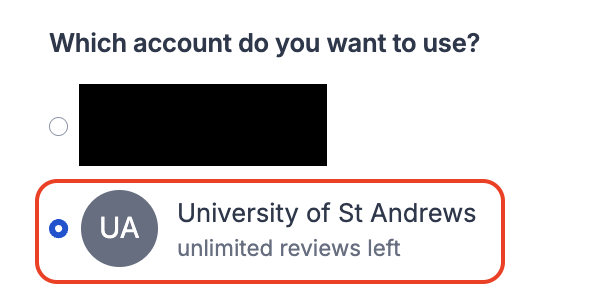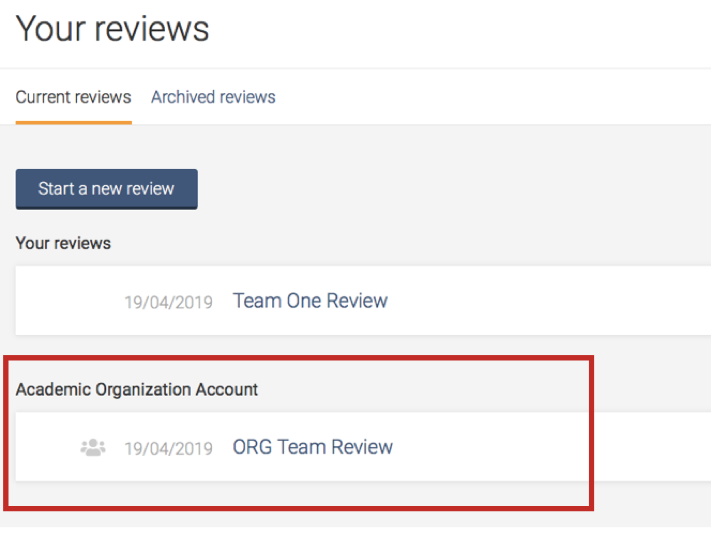Institutional subscriber information
University of St Andrews (Trial)
Updated 3 weeks ago

University of St Andrews is delighted to announce it is trialling an unlimited institutional licence to Covidence for its staff, researchers and students.
This licence (running till 31st March 2026) is to understand usage across the university and the benefits that the tool can provide for researchers involved in systematic/scoping/rapid/literature reviews.
Benefits of accessing the licence in Covidence?
Unlimited references/citations for each review.
Unlimited number of reviewers for each review (irrespective of their affiliation)
Unlimited number of reviews.
How to access the University of St Andrews institutional licence with Single Sign-On (SSO):
New Users - If you have not yet signed up to Covidence with your university email address, a user account needs to be created. You can do this simply by signing in via Single-Sign-On (SSO).
Go to this SSO Sign-in page, and enter your university credentials
If you have entered the correct credentials, you will be redirected back to Covidence
A prompt will appear if you have an existing account with a different email address and ask if you would like to connect it with your university's SSO and keep your work in one place. Sign in if you have the other account's credentials OR continue with 'Create a New Account'
Existing Users - If you have previously used Covidence and already have a user account associated with your university email address, simply log in via SSO to see your existing reviews and to create new reviews.
Go to this SSO Sign-in page, and enter your university credentials
If you have entered the correct credentials, you will be redirected back to Covidence to your existing account
Whenever you sign in via SSO, whether to a new account or an existing account, your account will be linked to the university licence.
Alternatively, users can sign in via the Covidence sign-in page and select the "Sign in with SSO" option.
Please note: If you sign in to your account via a method other than SSO, you’ll see all your existing reviews and be able to work on them. However, you'll not be able to start new reviews under your university licence. If you have gone to the Start a New Review page and the University licence is missing, where you think it should be available, check first to ensure you have signed in to Covidence via your university SSO.
Starting a review using the university's unlimited licence:
Sign in at this SSO Sign-in page
Select “Start a new review”
Under 'Which account do you want to use?', select "University of St Andrews"

Reviews created using the university institutional account will be visible to Covidence subscription administrators at the university. Reviews created using your personal account are only visible to you.
Once you have created a review or accepted an invitation to another university account review, the title will appear in a separate section on your account homepage:

More about Covidence
The Covidence interface is intuitive and suitable for students and experienced reviewers. Covidence can save time on repetitive review tasks, enabling faster review production and more time for analysis and interpretation.
Discover more about Covidence on each link:
Import references - Covidence works seamlessly with reference management software such as EndNote (Desktop or Online), or any tool that supports RIS or other file formats. Covidence can automatically remove duplicates for you.
Screen title & abstract - Breeze through screening with keyword highlighting & a lightning-quick interface. Covidence keeps full records of who voted and supports single or dual screeners.
Bulk PDF import - Transfer PDFs stored in your reference manager to Covidence in a few clicks.
Screen full text - Decide quickly on studies in full text. Capture reasons for exclusion and any notes so you can resolve any disagreements quickly, with a click of a button.
Create forms - Be in control and stay focused on your PICO question. Customisable extraction forms mean you only spend time extracting what you need.
Customise risk of bias - Automatically populate your risk of bias tables by highlighting and commenting on the text directly in your PDF.
Conduct data extraction - Extract data efficiently with a side-by-side view of your customised form and PDF. Then, when you are done, easily compare your form with other reviewers.
Export - Covidence exports to all the common formats, so you can continue your review in your preferred software.
Collaborate - You can invite other reviewers (including external colleagues) to work with you on the project.
Support from Covidence
Covidence offers a range of available resources and support to help you along the way with your systematic review process.
To get familiar with how a Covidence workflow works, you can try our pre-set Demo review. This will allow you to gain hands-on experience and better understand the process. You will find it at the bottom of your dashboard once you have signed in. Give it a go and feel free to explore!

Getting started with Covidence - video tutorials that guide you through the initial area to get you started.
Covidence Knowledge Base - home to all of our comprehensive articles, instructions and advice to FAQs.
Covidence Academy - Learn and understand the essentials of systematic reviews and gain insight with expert-led training and content to guide you through every step of the review process.
Covidence eBook Collection - Download our step-by-step practical guides for Systematic Review Success!
Monthly Open Training Webinars - Join our Community Team for free webinars (registration required) or watch our recent recordings without delay.
Online Support Team- contact our team directly for support on your review by emailing support@covidence.org
When logged into your account, you can also easily contact the Support Team and the comprehensive articles from our Knowledge Base within Covidence by clicking the 'Need help?' button in the lower right-hand corner of the screen.

If you are leaving the University
We recommend adding a secondary email address before you leave to ensure a seamless transition and continued use of your Covidence account without interruption.
If you need to log back into your Covidence account but cannot because you don’t have access to your university email address anymore, please get in touch by emailing support@covidence.org.

